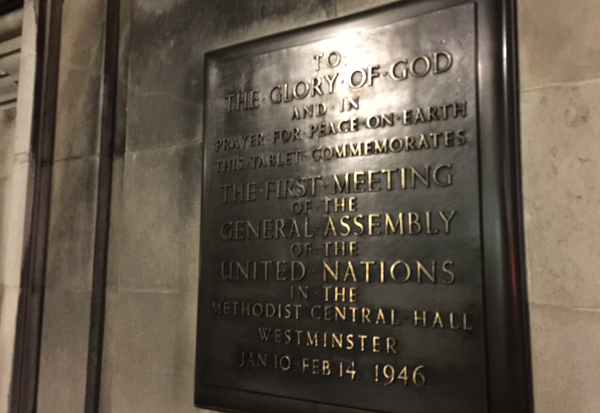Justice vs Peace

As the world watches the shaky ceasefire in Gaza, the issues of peace and justice intermingle, strain, and collide. For those who work on conflicts, these are familiar tensions, but the underlying debates rarely get wider attention.
The basic issue is this: to get any kind of peace deal in any conflict, the leaders of the warring parties have to agree to it and then enforce it. However, those very same leaders are usually responsible for war crimes and other atrocities committed during the conflict.
If stopping the fighting might somehow initiate or promote investigations and prosecutions of their war-time actions, they won’t be so keen on peace. When negotiating deals to end the conflict, they’ll insist on immunity clauses for themselves and their henchmen.
Let’s all just pretend those appalling crimes never happened and move on. It’s an interest both side’s leaders will share, something they have in common.
The victims of war-time atrocities on all sides also have something in common. They are cut out of the top-down deal. Civilians were bombed, children were starved, and prisoners were tortured, yet the perpetrators escape punishment. War criminals continue ruling and enjoying the perks of power. Survivors and their families are denied justice.
Still, if that’s the price of peace – if that stops the bombing and the starvation and the atrocities happening right now – then, many feel, it’s worth it. Yes, the criminals will get away with their horrific acts, but the slaughter ends. And that should be the priority at this moment, right?
After more than two decades grappling with these issues in conflicts around the world, I’ve seen them from both sides.
When I worked at the International Crisis Group, the focus was primarily on peace-making. Get to a deal to silence the guns. If promising immunity to those who committed crimes is necessary to get there, so be it. Too many people are suffering right now to wait for a deal that includes difficult- or impossible-to-negotiate justice measures. Don’t let the perfect be the enemy of the good.
When I worked at Human Rights Watch, the focus was on the other side, on justice. It’s a moral and legal imperative: no one should be able to commit mass atrocity crimes (war crimes, crimes against humanity, genocide, ethnic cleansing) and get away with it.
The international precedent it sets is also an issue. If leaders in a conflict today see that war criminals from previous conflicts are rotting in prison, they’ll think twice about their actions.
Well, that’s the idea anyway.
Looking around the world at the conflicts of recent decades and seeing so many notorious war criminals still at large, it’s hard to say this idea is working. National efforts to bring criminals to justice are slowed or blocked by vested political interests. Local strongmen remain strongmen and hold the reins of power, including over the courts.
When all else fails at the national level, there are international courts. However, international justice can seem like a faith-based community. We believe in it, but proof of its existence is rare, and almost miraculous when it happens.
Its harshest critics would say it’s all too idealistic. The notion that someone like Israel’s Benjamin Netanyahu or Russia’s Vladimir Putin – both indicted by the International Criminal Court for atrocities – will ever actually face trial in The Hague is wishful thinking.
The international justice folks would reply: you never know. Things change. Political systems shift or collapse. Leaders lose support.
Indeed, I’m old enough to remember pessimists saying Yugoslavia’s Slobodan Milošević would never see the inside of the courtroom at the International Criminal Tribunal for the Former Yugoslavia – until he was there in the dock. And I’ve seen first-hand how survivor-led movements can succeed in getting their former persecutors tried and convicted, like Chadian dictator Hissène Habré via a special African court.
Critics might argue these were marginal cases compared to big international fish like Netanyahu and Putin. International justice supporters would counter that they were hardly marginal to their countless victims.
Both sides of this endless debate can probably agree on one thing. The most reliable predictor of future conflict in a place is past conflict in that place. In large part, this is because of unresolved injustices. Resentments over past crimes simmer. Then, they boil over.
In other words, “they got away with mass murder” is not a great way to build a lasting peace.
The question at its core then, is this: how much should we risk future peace to get a much-needed end to hostilities happening right now?
I’ve been working on these things for more than twenty years, and I don’t have any easy answers. I’d love to hear from readers what they think. Drop a note in the comments online, send me an email, or reply on my social media feeds (BlueSky; Mastodon; LinkedIn; Instagram; Facebook; Threads).
========
Quick links:
More on international justice 1: “A little too late? The ICC’s first Darfur conflict conviction” from the Institute for Security Studies. It looks at the International Criminal Court’s fresh conviction of Ali Muhammad Ali Abd-Al-Rahman (aka Ali Kushayb) on 27 charges of war crimes and crimes against humanity. The situation in the Darfur region of Sudan was referred to the Court 20 years ago. Meanwhile, on the ground, conflict and atrocities have returned to Darfur and other parts of Sudan today.
More on international justice 2: A recent New York Times article about Syria shows how hard it can be to bring suspected war criminals and torturers to justice: “The Vanishing Act: How Assad’s Top Henchmen Fled Syria, and Justice”
More for very few: A new Oxfam Briefing Paper looks at inequality in Europe. It’s full of grim figures, like “the richest 1% in the EU own nearly a quarter of all wealth while half the population share just 3%.” How did we get here? “Decades of tax cuts for the wealthy and corporations resulted in the super-rich paying proportionally less taxes than ordinary citizens…” The alarming impacts on democracy and social stability should worry us all. Oxfam concludes: “Taxing the super-rich is widely supported, is feasible and is urgent.”
More regrets: Brexit was sold as the solution to all the UK’s problems, and a slim majority of voters in 2016 sadly believed some self-serving politicians’ hype and lies about it. Polling over the past few years shows strong Bregrets. Most Brits think it was wrong to leave the EU. Top experts agree: “Brexit impact on UK economy ‘negative for foreseeable future’, Bank of England chief says”



